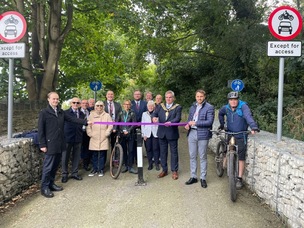A POTENTIALLY fatal link between Barnsley’s industrial past and its lower-than-average life expectancy rates is being probed by health bosses after concerns were raised about a radioactive gas synonymous with causing cancer.
Radon is a colourless, odourless radioactive gas formed by the decay of the small amounts of uranium that occur naturally in all rocks and soils.
Radiation from particles damages lung tissue and over a long period may cause lung cancer.
The higher the level and the longer the period of exposure, the greater the risk will be and radon exposure is now the second-largest cause of lung cancer in the UK.
Concerns were expressed by a Barnsley Council scrutiny panel - tasked with delving into the town’s life expectancy rates - after medics warned the ‘stark’ picture was not improving.
Life expectancy at birth for males is 77.1 years - a reduction of 0.8 years in just 12 months - while females register a slightly higher average of 81.1 years, which is also lower than the previous 81.8, according to the Office for National Statistics (ONS).
“Concerns around radon gas were raised and whether this was an issue in the borough with its history of being a mining town,” a report said.
“Members expressed worry that the borough’s life and healthy life expectancies were so low, particularly as all the hard industries such as mining and steel had been gone for decades and more so in men than women.
“This is not unique to Barnsley - there were also multiple leading factors to ill health such as smoking, alcohol use and obesity which was high in the area.
“The decline in healthy life expectancy since 2015 was recognised as being a result of austerity and the impact that had had on services and investments in the Barnsley area.
“It was noted that women generally were more familiar with the healthcare system as they had more exposure to healthcare throughout their lives so it was not seen as much of a challenge for them to speak up and access help.
“In terms of healthy life expectancy, the data was unable to drill down into geographical area specific statistics.
“However it was noted that there were some inequalities showing that people from Penistone had a higher life expectancy than people from the Dearne or the centre of town.
“The statistics did show that men had a lower life and healthy life expectancy than women.”
Further investigations are set to be carried out locally to see if residents - particularly ex-miners - were suffering with its impact after cross-party MPs lodged complaints with the government about hard-to-secure compensation payments relating to industrial diseases.
Under a scheme set up in 1999, miners can claim compensation for industrial injury caused through working in the mines.
Ailments covered by the scheme include respiratory illnesses such as lung cancer, pneumoconiosis, bronchitis and emphysema, as well as industrial deafness and vibration white finger.
A letter, jointly sent by MP Conor McGinn, chair of the All-Party Parliamentary Group on Coalfield Communities and Chris Kitchen, general secretary of the National Union of Mineworkers, called on the government to ‘better understand’ miners’ health conditions.
It said: “Years of relentless work, in tough conditions, significantly increased the risk of health problems for mine workers.
“These included the prospect of severe respiratory conditions caused by the inhalation and retention in the lungs of coal dust such as silicosis, asbestosis and lung cancer.
“These illnesses have an enduring impact for many older people in our communities.
“For those living and sadly dying with these underlying conditions, the importance of a full and precise diagnosis is absolutely vital, not least to treat it, but also to allow access to richly deserved and hard-fought financial support.
“We are asking the government to do all it can to improve and promote thorough diagnostics, research and better understanding of these industrial diseases among officials and the public alike, while also ensuring existing support can be easily accessed by the families of those who have tragically lost loved ones.
“More broadly, we want ministers to do more to support healthcare and wider regeneration in former coalfield areas which we know suffer disproportionally from poor health and lower life expectancy.”




























